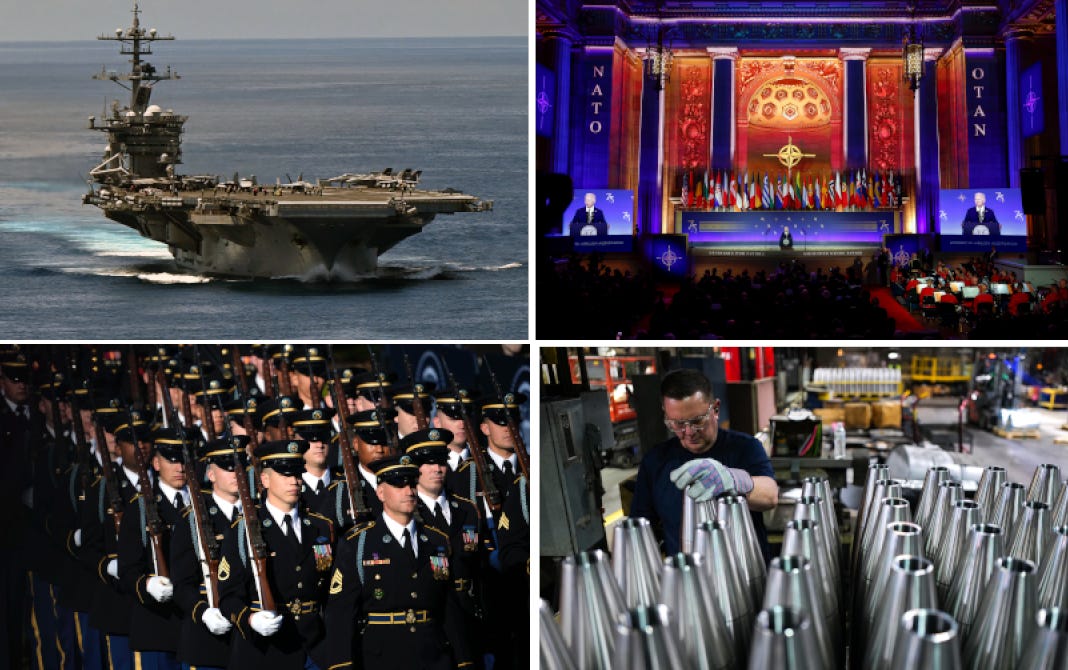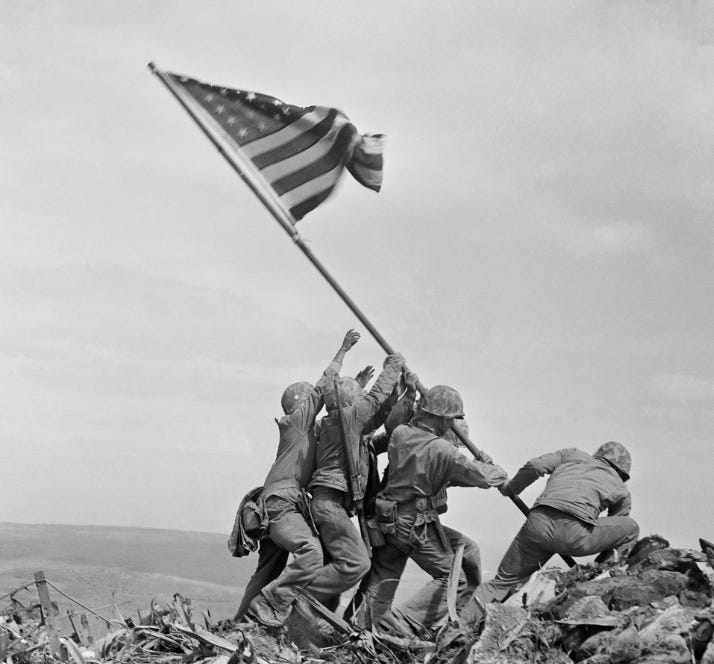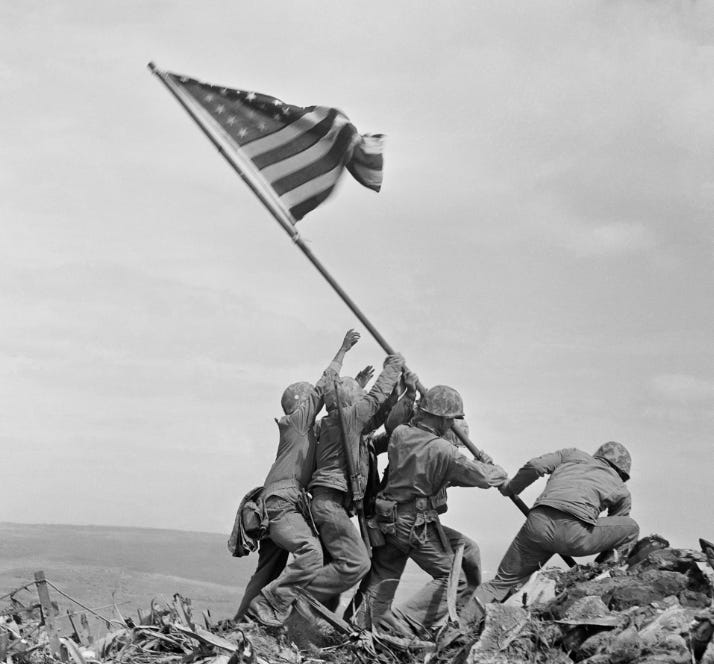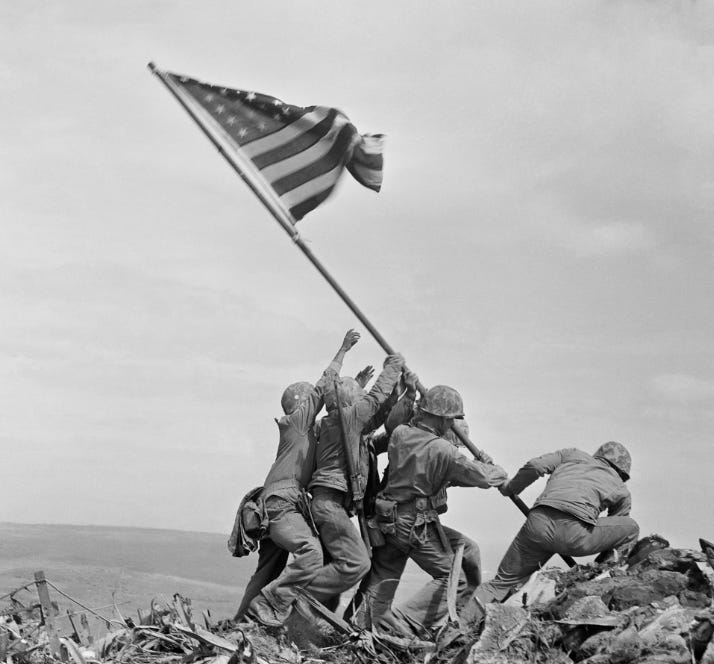Should America be the World's Policeman?
Lee Fang and I opposed interventionism in a debate with Bret Stephens and Jamie Kirchick in New York this week. Technically we won, but it felt like a big loss
On Wednesday night, in the Peter Norton Symphony Space on the Upper West Side, Lee Fang and I debated New York Times contributor and Atlantic Council fellow Jamie Kirchick and Times columnist Bret Stephens. The event, hosted by the Free Press and FIRE and moderated by Bari Weiss, turned on the question: “Should the U.S. Still Police the World?”
We won, but absurdly, moving opinion two points from an astonishing 81%-19% in favor of “World Policing” to 79%-21%. Lee was terrific and may have dealt the deciding sequence via an exchange with Stephens on Pol Pot and the Khmer Rouge. You can read his excellent opening and closing remarks here. There is not yet a video to post, a fact I’m not mourning.
I performed poorly. My weakness in debates is temper and just being in a building with Stephens, who last year wrote “20 Years On, I Still Don’t Regret Supporting the Iraq War,” put me on the edge of losing it. In opening remarks the coiffed, Yale-educated Kirchick riffed on nineties TV while Bret told a long joke about a pig with a pegleg, the one whose punchline is, “You don’t eat a pig like that all at once.” The crowd roared.
A few thoughts on the event, and my reasons for joining Lee in believing the U.S. should not continue to police the world:
Two weeks ago I gave a patriotic speech in Washington, D.C. I spent a month before searching for words to articulate the peculiar state of being proud of one’s country while loathing its leaders. That the original Americans would have recoiled from the job of “World Policeman,” I don’t doubt. They were suspicious of a professionalized military. Madison at the Constitutional Convention warned the democratic project contained a built-in contradiction, that as it prospered and grew, it would create threats to itself. “The means of defence against foreign danger,” he said, “have been always the instruments of tyranny at home.”
America was born in revolt against empire and the royalist twits who laid down its dictates in the colonies. The revolution was a clash of personality types, between those who thought they had as much right to pursue happiness as kings had to pursue “dominion and revenue,” and those who made the cause of kings their own. One was his or her own person, the other a servant, though often a well-heeled one.
I took a few lines out of the Washington speech address about how, on top of creativity and industriousness and defiance, Americans have often shown themselves to be a tough people, with whom it’s a bad idea to pick a fight. There’s a reason Humphrey Bogart got cheers when he told Conrad Veidt’s Heinrich Strasser character that “there are certain sections of New York, Major, that I wouldn’t advise you to invade.”
Casablanca is the enduring artistic homage to one of the momentous turns in our history, when we threw off isolationism to join the fight in World War II. Bogie’s Richard Blaine is a wounded cynic, a man burned in love whose creed is, “I stick my neck out for nobody.” Twin screenwriters Julius and Philip Epstein skillfully showed Rick conquering self-pity and sacrificing his happiness for the greater good. It’s significant the great patriotic scene is “La Marseillaise,” symbolizing how Rick’s cause isn’t America’s but that of all suffering nations. He gives up the girl, but his reward is the respect of a Czech hero, who says, “Welcome back to the fight.”
I love that movie. Who doesn’t? It’s gorgeous and funny and romantic, and historical truth saves it from being propaganda. World War II was a just war, with a clear objective. We were attacked, we fought back, we defeated the enemy. The epic nature of the victory, charging up defended beach in history’s largest sea invasion in one hemisphere while splitting the atom in another, changed us overnight from middling power to the envy of Rome or Alexander. America was magnanimous in helping defeated Germany and Japan back on their feet, and the strength showed in turning enemies into allies made a powerful argument that we did deserve to inherit the world.
That was eighty years ago, though. Before World War II the British mocked us as a bumbling giant too timid to become a global power. A Foreign Office memo said, “They have enormous power, but it’s the power of the reservoir behind the dam.” Now we throw our weight around all the time, and somehow, there isn’t much left behind the dam.
That’s not a material or financial assessment. Our biggest losses since 1945 have been in the realm of things Caesar measured when considering the worthiness of adversaries: valor, dignity, judiciousness. With our awesome military and resources we should never lose a war, but we’ve suffered numerous humiliations at the hands of more furious and determined adversaries in Vietnam, Iraq, and Afghanistan, to say nothing of disasters like our Libyan engagement. The common theme has been politicians betraying soldiers by saddling them with unjust or unclear missions, against people fighting on their own land for their lives and families. These losses haven’t dented our military power, but they have drained any claims to honor, things unfortunately not detectable to those reading line items in Washington.
Casablanca made the “fight for love and glory” famous. There hasn’t been much glory in being the “World’s Policeman,” in large part because the people in charge of our wars, and arguing for them, are no longer the ones doing the fighting.
Kirchick, who has a long and colorful history that includes work for Tablet and the Prague desk of RFE/RL as well as fellowships with the Brookings Institute and the Foreign Policy Initiative, has a refined public persona. He aims for convivial and amusing in tone and usually hits it, and ably represents the well-turned-out-conservative tradition mastered by fellow Yalie Bill Buckley, wearing brash tie-jacket combinations that say, “The staunch national security advocate doesn’t have to be boring.” The ability to deliver arguments that hold interest even when you disagree is usually the sign of a good commentator, and Kirchick has it, even in the increasingly unreadable Atlantic.
I don’t have a transcript, but one of the themes of Kirchick’s presentation Wednesday was, “If not us, who?” More than once it was pointed out that while he and Bret made their positions clear, Lee and I hadn’t explained our plan, said who we thought should be running the world. I hadn’t prepared for the question because I didn’t realize it was accepted fact that someone has to police the world. Instead of attacking that premise, something about Jamie’s cheery delivery and outfit roiled and I said something to the effect of being uncomfortable in general with well-fed intellectuals debating the wisdom of wars they’re not going to fight.
Jamie took offense. “We have a volunteer army,” he said. “They know what they’re getting into. They made a choice…”
“They chose because they’re poor and they don’t have any opportunity,” I said. “Why don’t you fight?”
“Me? I’m too old,” Jamie said.
Lee interjected that while a student at Yale, and arguing for the Iraq war, Jamie said that he didn’t go fight because he was still in school. “Then, you’re too young. Now, you’re too old,” Lee quipped, adding that Ukraine is sending plenty of soldiers in their forties to the front.
Things got hot for a moment, then Bari moved the discussion to the impact of “world policing” on the upcoming election. I noted that traveling around the U.S. in the 2016 cycle I met soldiers who showed up at Donald Trump’s rallies in larger and larger numbers. Some were responding to his “endless wars” rhetoric, others said they were just curious. Many had been stop-lossed into multiple unexpected tours, or had been injured or seen friends die in an idiotic war, and then come home to find VA services in tatters and economic opportunities hollowed out.
They were pissed, more than anything at politicians and intellectuals who asked for sacrifice without making it themselves. Far more than the 2008 financial crisis, it’s America’s moronic wars that drive anger toward “elites.” Stephens once wrote a Python-themed satirical essay that spoofed the idea that rich Fox News hosts should have any gripe with “elites” (“What Have the ‘Elites’ Ever Done For Fox?”), and maybe that point’s well taken, but the people who watch Fox News have real reasons for real animus toward the war-deciding class.
Kirchick doesn’t bother me personally. Stephens is different. It would take time to explain, but for instance, Bret in a 2014 book on the horrors of isolationism (written while the paint was still drying on our Iraq disaster) once proposed that America bring “Broken Windows” to the entire world; I wrote two books on the failures of Broken Windows policing. Every time Bret spoke, I flashed to different interviews about Stop-and-Frisk encounters: kid jailed for having Hi-Liter, kid knocked by cops off bicycle, kid pantsed and testicle-searched in front of laundromat, kid put in Rikers for 37 days for having an amount of marijuana New York decriminalized in 1977, etc.
Bret took time during his opening to laud Lee and me and offer expressions of his respect for our journalism, when I have a fair idea he dislikes me at least as much as I do him. I think it was an intimidation tactic, showing he could drink the battery acid of a compliment for the sake of a win. Meanwhile the torture device hasn’t been invented that would induce me to speak something nice about him, which I tried to console myself meant my emotions were more sincere, even as I could see his garrulous approach was playing better with the crowd.
In response to the salvo about hawks who don’t fight, Stephens said a number of things. One, he’d been embedded in Iraq and Afghanistan, so it wasn’t like he didn’t take risk. (I’ve been embedded. You’re a tourist for whom soldiers are asked to take a bullet. Being anything but embarrassed by it is impressive.) He also spoke of soldiers in Afghanistan feeling betrayed that they weren’t allowed to continue their mission to protect the population. He conceded that, yes, there had been “blunders” in Iraq and Afghanistan, but that didn’t mean we couldn’t improve and do the policing job better. As he wrote in his “Why I Don’t Regret the Iraq Thing” piece, “We do better as a cop than as a savior.”
In closing I quoted a passage from Colin Powell’s memoir, My American Journey:
My constant, unwelcome message at all the meetings on Bosnia was simply that we should not commit military forces until we had a clear political objective… The debate exploded at one session when Madeleine Albright, our ambassador to the UN, asked me in frustration, ‘What’s the point of having this superb military that you’re always talking about if we can’t use it?’ I thought I would have an aneurysm.
I thought I was making an obvious point, that giving power to politicians who are interested in an intellectual way in using our “superb military” without grasping the spiritual gravity of those decisions leads to morally insane acts like Iraq. Invading a country whose people have done nothing to us isn’t something you can shrug off as a “blunder.” The shame sticks, it arouses enmity, and (in a way I don’t think hawks even try to understand) advertises superficiality of thought, which is a kind of weakness. A trigger-happy nation is a dumb nation, and dumbness doesn’t scare anyone.
We’ve been dumb a lot. We backed massacres of (conservatively) 500,000 by the Indonesian Army under Suharto in the mid-1960s, were complicit in deaths of nearly 2,000,000 civilians lost in Indochinese wars (including a generation of horrific birth defects caused by Agent Orange), 160,000 killed in Guatemalan massacres, 200,000civilians killed in Iraq, 50,000 more in Afghanistan, tens of thousands more in Chile after the 1973 coup, the El Mozote massacre in El Salvador in 1981, and so on.
A few people after the event asked why Lee and I didn’t speak more concretely about when it would be appropriate to intervene to stop, say, a Rwandan-style massacre. They’re not bad questions, but they’re what people ask after decades of editorials by decades of Brookings fellows. Given our history, which includes a long list of too-smart-by-half moves like (as Lee noted) supporting the Khmer Rouge as a counterweight to the Vietnamese, it seems to me the first question to answer is how to avoid actively promoting massacres and genocides. When we get that straightened out, hopefully by returning to a true necessity standard when it comes to using force, we can start arguing about when and how to go about saving the world.
The crowd didn’t agree. Stephens followed me in his closing, pouncing on the quote. “Thank God Madeleine Albright didn’t listen to Colin Powell in Bosnia, so we could stop genocide and ethnic cleansing!” he said, to cheers.
In 1955 Graham Greene published The Quiet American. Set in Vietnam in the early 1950s, the book is narrated by fatalistic opium-eating English journalist Thomas Fowler, for whom youth is just a memory, much as Britain itself by then only had memories of imperial glory. Fowler loves a Vietnamese woman named Phuong, but loses her to a new rival, the American CIA agent Alden Pyle, who’s just arrived bursting with plans. Greene’s description:
Only ten days ago he had been walking back across the Common in Boston, his arms full of the books he had been reading in advance on the Far East… He was absorbed already in the dilemmas of Democracy and the responsibilities of the West; he was determined—I learnt that very soon—to do good, not to any individual person but to a country, a continent, a world. Well, he was in his element now with the whole universe to improve.
Greene made Alden Pyle excitable, naive, boyish, a man who wore his lack of local knowledge with pride, like it was “a Scout’s badge.” The can-do CIA man compared colonial rule to college hijinks — when the puppet General Thé bombs women and children instead of soldiers, Pyle scolds him “like the captain of a school team who’s found one of his boys breaking training.”
To Pyle, everything is simple. He has a theory about introducing American power as a policelike “Third Force” mediating troubled relations between the French and Vietnamese, and feels sure of success because “these people aren’t that complicated.” As things fall apart, however, he has to use violence more and more, engendering more and more enmity. But he can’t ever see the connection between his incuriosity and Vietnam’s suffering. He was, Greene concluded, “impregnably armored by… his ignorance.”
This was just a book when I first read it at 18, but within a few years I moved to post-communist Russia and was stunned to find the place filling with legions of Alden Pyles. The irony was incredible. One crazy world-domination plan cooked up by a different group of overgrown college theorists from the Soviet side had just collapsed, and we sent our own replacements in the form of experts in “democracy promotion.” These were beer-crazy kids fresh out of the Ivies and flush with the nation-building cash flowing from organizations like the USAID and the National Endowment of Democracy.
I’d see them in restaurants dressed in Princeton or Penn or UChicago sweatshirts cheerfully discussing when to terminate Russians’ medical coverage or heating subsidies. They openly meddled in elections and had an advanced system for picking politicians: the ones who spoke English were “reformers,” and those who didn’t were “revanchists” or “hard-liners.” Over the years I watched them do jell-o shots, blow thousands of taxpayer dollars on banquets and parties, and fall stumbling out of brothels. The first and only person I ever saw buy cocaine through a translator was an American aid worker.
These are the people making our foreign policy decisions: overgrown, imbecilic, resentful schoolkids. Our universities and think-tanks crank them out factory-style, like shells.
On Monday, in what’s fast becoming one of our only interesting national political rituals, Peter Doocy of Fox News mixed it up with White House spokesperson Karine Jean-Pierre. The subject was hurricane response. Vice President Kamala Harris previously announced $157 million for an “increasingly dire humanitarian situation” in Lebanon, while Joe Biden wrote to Congress asking for funding for disaster relief.
Doocy asked, “If he’s got money for people in Lebanon right now without Congress having to come back, what does it say about his values? There’s not enough money right now for people in North Carolina who need it. That’s not misinformation.”
Jean-Pierre frowned. “Your whole premise of the question is misinformation, sir,” she snapped, before a huffy Snagglepuss exit.
Press on both sides made a big deal of this for partisan reasons, but the underlying issue was the broad one of Wednesday’s debate. The tension between domestic governance and the demands of empire has been growing since 1945. Once we began paring back rights after 9/11 to more fully operationalize America as an international power, we made inevitable the moment when the military mechanism would begin to view its own exhausted, less-than-war-enthused population as a threat. It’s Madison’s warning brought to fruition.
We’ve been fighting almost constantly for eighty years, but the imperial reflex is so ingrained that even people walloped in hurricanes in Florida or the Carolinas are told to stop complaining about money sent overseas. It won’t hold. If you ignore the nation too long, it ends up another occupied territory. This is why calls for censorship to stop “misinformation” are growing more overt by the day, with former Strikethrough host Carlos Maza* just today calling free speech an “unmitigated disaster.” Each day we hear more tools for control are needed to save “democracy,” which is now just euphemism for the imperial project. This is another revolutionary prediction, that as power is concentrated, conflict replaces commerce. When Henry Luce at Time announced the “American Century” in 1940, he thought we’d rule with “jazz, Hollywood movies, American slang, American machines, and patented products.” But war changed our identity.
When does it end? The main takeaway from Wednesday’s debate was that the advocates for “world policing” not only don’t want it to end, they find the question offensive. And in the most influential spaces, nearly everyone agrees.









1 opmerking:
>"When Henry Luce at Time announced the “American Century” in 1940, he thought we’d rule with “jazz, Hollywood movies, American slang, American machines, and patented products.” But war changed our identity."
Mini Doc: Gore Vidal's History of the National Security State
Een reactie posten